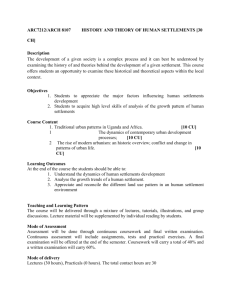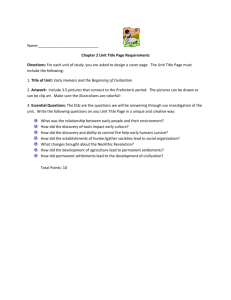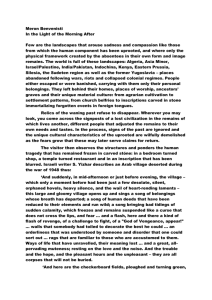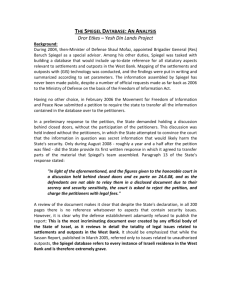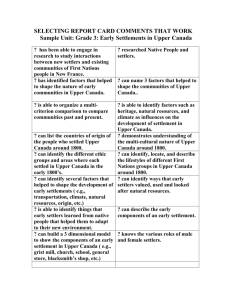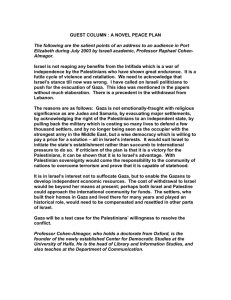Testimony Before The Near Eastern and South Asian Affairs Subcommittee... Senate Foreign Relations Committee
advertisement
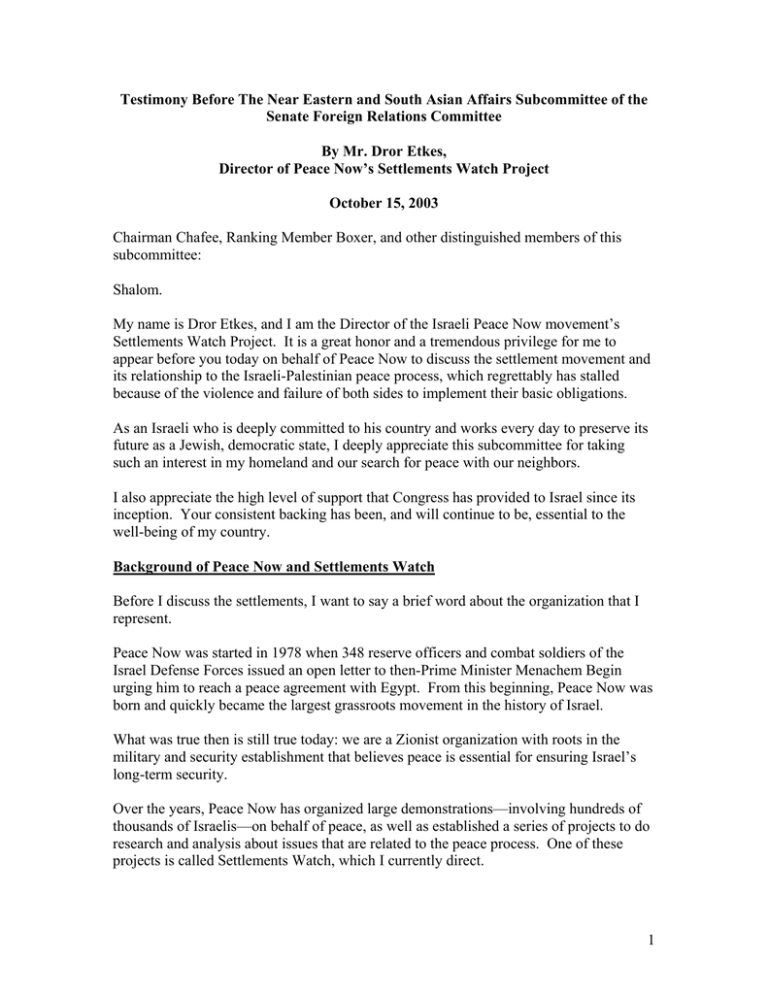
Testimony Before The Near Eastern and South Asian Affairs Subcommittee of the Senate Foreign Relations Committee By Mr. Dror Etkes, Director of Peace Now’s Settlements Watch Project October 15, 2003 Chairman Chafee, Ranking Member Boxer, and other distinguished members of this subcommittee: Shalom. My name is Dror Etkes, and I am the Director of the Israeli Peace Now movement’s Settlements Watch Project. It is a great honor and a tremendous privilege for me to appear before you today on behalf of Peace Now to discuss the settlement movement and its relationship to the Israeli-Palestinian peace process, which regrettably has stalled because of the violence and failure of both sides to implement their basic obligations. As an Israeli who is deeply committed to his country and works every day to preserve its future as a Jewish, democratic state, I deeply appreciate this subcommittee for taking such an interest in my homeland and our search for peace with our neighbors. I also appreciate the high level of support that Congress has provided to Israel since its inception. Your consistent backing has been, and will continue to be, essential to the well-being of my country. Background of Peace Now and Settlements Watch Before I discuss the settlements, I want to say a brief word about the organization that I represent. Peace Now was started in 1978 when 348 reserve officers and combat soldiers of the Israel Defense Forces issued an open letter to then-Prime Minister Menachem Begin urging him to reach a peace agreement with Egypt. From this beginning, Peace Now was born and quickly became the largest grassroots movement in the history of Israel. What was true then is still true today: we are a Zionist organization with roots in the military and security establishment that believes peace is essential for ensuring Israel’s long-term security. Over the years, Peace Now has organized large demonstrations—involving hundreds of thousands of Israelis—on behalf of peace, as well as established a series of projects to do research and analysis about issues that are related to the peace process. One of these projects is called Settlements Watch, which I currently direct. 1 Settlements Watch was established because Peace Now has always thought that settlements in the occupied territories threaten our existence as a Jewish, democratic state, weaken the security of Israel, drain our economic resources, undermine our society’s moral fiber, and serve to perpetuate Israeli rule over another people in a way that prevents Israel from reaching peace with the Palestinians. The settlements today pose an existential threat to the future of Israel. Let me be very clear: it is in Israel’s own best interests to separate itself from settlements and the occupied territories that the settlers would have us bind to the state. The former head of Israeli military intelligence, Yehosephat Harkabi, summed up the problem like this in a lecture to an American audience during the Cold War. He said, “You Americans have the most powerful army in the world. No one can challenge you. But if you had 120 million Russians living in America—all completely loyal to the Soviet Union—your great army would be of no use and you would not be safe. That is our situation. The simple fact is that we must either have a Palestinian state in our neighborhood or we will become a Palestinian state.” Our circumstances have not improved since Harkabi spoke those words. The West Bank and Gaza are not empty—besides the settlers, they are now home to about 3.5 million Palestinians. And given demographic trends, those Palestinians, combined with Israeli Arabs who live inside the Green Line, will guarantee that Jews will soon be a minority in the land between the Jordan River and the Mediterranean Sea. When that day comes, Israel will cease to be a Jewish, democratic state. We will no longer be a Jewish country because Israeli Jews will be outnumbered by our Arab neighbors, and therefore we will be forced to become a bi-national state, with the prospects for a civil and stable bi-national state being virtually impossible. Or we will choose to forego all acceptable norms of democracy in order to maintain Jewish minority supremacy over an Arab majority. Both of these options should frighten all friends of Israel in the Senate and elsewhere in the United States. But we will rapidly be forced to choose between these options unless firm measures are taken immediately to free us, our allies, and our neighbors from the stranglehold of the settlements. Settlements weaken our security because each settler, each settlement, and each bypass road connecting Israel to the settlements requires protection from the Israeli military. Our soldiers are required to put their lives on the line every day to defend Israeli communities deliberately placed in the midst of Palestinian population centers in order to break up Palestinian territorial contiguity. In the West Bank, the Israeli line of defense is roughly ten times longer than the Green Line because of the need to protect the settlements and their supporting infrastructure. 2 A recent extensive study by a leading Israeli newspaper, Ha’aretz, found that Israel spent a little under a half billion dollars a year to maintain about 10,000 troops in the occupied territories prior to the Intifada. Ha’aretz also found that our Defense Ministry is spending roughly double that amount, more like $1 billion, these days because of the ongoing violence. These are troops and money that could be committed to defending our border. Beyond stretching Israel’s defense capabilities, the settlement movement costs Israeli taxpayers at least $556 million in extra non-military spending each year, according to the Ha’aretz study. Total spending on settlements has amounted to over $10 billion since 1967. Settlements also harm Israeli interests by undermining the political authority of moderate Palestinian leaders, the sort of leaders who are interested in stopping terror. For these leaders to be able to advance their political agenda, they need to prove to their constituents that a non-violent path of negotiations can lead to a future Palestinian state in the West Bank and Gaza. They are battling every day for the hearts and minds of the Palestinian street. Settlement construction delivers a message layered in concrete and steel that Israel is not interested in negotiations. Finally, Peace Now is concerned about settlements because they work to ensure that Israeli and Palestinian populations are woven together throughout the territories and make it impossible to separate the two societies into two viable, independent states. This is not an accident. This is the result of deliberate planning by the settlement movement and its supporters in different Israeli governments over the years, especially our current Prime Minister, Ariel Sharon. Settlements and the Peace Process Now let me turn to the question of the role that settlements play in the peace process at the present time. It is important to keep in mind that despite the fact that settlements are a significant obstacle to peace, there is no moral equivalency between settlements and terrorist attacks. There is obviously a difference between building a red-roofed home in the West Bank and sending a suicide bomber to take the lives of innocent Israelis. I would echo the sentiments of both Amnesty International and Human Rights Watch in emphasizing that terrorist attacks against civilians—including settlers—are war crimes and crimes against humanity. I also recognize that settlements are not the only cause of tension between Israelis and Palestinians. 3 At the same time, in a process that is supposed to see Israelis and Palestinians exchanging land for peace, settlements have a lot to do with what Israel is supposed to deliver through negotiations to the Palestinians, but has largely not provided. Here are the basic facts: according to Israeli government sources, there are approximately 230,000 settlers today living in 145 settlements in the West Bank and Gaza considered official under Israeli law and over 120 settlement outposts established since 1996 without proper Israeli authorization (although not all of these outposts are still in existence since around 20 of them—mostly uninhabited—have been dismantled). Roughly 7,000 settlers live in the Gaza Strip in 17 settlements, with the rest of the settler population living in West Bank communities. Although settlement construction covers only a tiny fraction of the occupied territories, Israel has expropriated approximately 50% of West Bank land, which has been taken over as “state land,” seized for “military purposes,” declared to be “abandoned property,” or expropriated for “public use.” Further, settlements and the territory they control are often placed near Palestinian communities to deny them the opportunity to expand or among Palestinian population centers to break up their contiguity. Contrary to popular belief, settlement expansion actually continued during the years of the Oslo peace process, with the settler population nearly doubling and thousands more settlement housing units being built. This escalation of settlement growth strengthened the popularity of Palestinian rejectionists and undermined the standing of moderate Palestinian leaders who backed the Oslo Accords. President Bush’s peace initiative explicitly recognizes settlements as an immediate problem and obligates Israel to deal with them. Although the ultimate fate of official settlements is left as an issue for Israel and the Palestinians to resolve in a final peace agreement, the Road Map lays out specific steps that Israel must take at the beginning of the process in order to prevent settlements from becoming an even worse dilemma. These steps should be taken by Israel whether or not this particular plan is successful. Outposts In the first phase of the Road Map, Israel is required to immediately dismantle settlement outposts erected since March 2001. Not after the Palestinians have succeeded in fulfilling all of their security obligations, but immediately. 4 And not just those outposts that Israel considers unauthorized or illegal, but all those built since a specific date, which coincides with when Ariel Sharon first became Prime Minister. Settlements Watch has been instrumental in raising the profile of the settlement outpost issue. We drive throughout the occupied territories and use aircraft overflights to document the establishment of these outposts and to track their growth. We consider outposts to be those settlements built without pre-authorization from the state, located a significant distance from official settlements, and provided with basic infrastructure for existing as independent communities. These outposts are established for a specific reason: to complete the chain of Israeli settlements along the areas that remained under complete Israeli control according to the Oslo Accords and to connect them with the isolated settlements in the heart of the West Bank in order to form more solid blocks of communities. This has been done with the awareness, and often the assistance, of the Israeli military and numerous Israeli governments. The outpost phenomenon is not new. This is the way that various settlements were started as early as the late 1960s. However, during the years of the Netanyahu government, settlers received support from right-wing Israeli politicians to use this method. It was Ariel Sharon, then Foreign Minister, who returned from the Wye negotiations in October 1998 and called upon the settlers to grab the mountain tops and establish new settlements to prevent the land from being turned over to the Palestinians. During Netanyahu’s term, roughly 50 new settlement outposts were established. This process reached a peak during the first Sharon government, during which approximately 75 new outposts were built (although a few have been dismantled). Prime Minister Sharon has occasionally gone through the motions of pretending to dismantle outposts, but this is a charade. The method for supposedly dismantling an outpost takes a familiar pattern: the government selects the right political time to engage in a limited battle of wills with a small and isolated outpost. The settlers—particularly the rowdy “hilltop youth”— respond with resistance to Israeli soldiers and police, who are often subject to violence and other abuse during the process. The cameras film it all, and it looks good on TV. But when the reporters go away, the settlers put up new outposts either in the same location, some place close by, or in a very remote area that is hard for journalists to reach. At this point, over 120 settlement outposts have been established since 1996, few have been truly evacuated, and the settlers continue to push to build new ones and solidify older outposts every day. Settlement Freeze 5 The second step that Israel is required to take under the first phase of the Road Map is to freeze all settlements activity (including natural growth of settlements). As I mentioned earlier, settlements and the settler population have continued to expand over the years of the peace process, thereby creating facts on the ground that make negotiating their future more difficult. Successive Israeli governments have used the excuse of “natural growth” as a loophole through which more settlement housing and bypass roads have been built and more settlers brought to the occupied territories. But, in fact, there is no such thing as “natural growth” when you discuss settlements. “Natural growth” would imply that some version of Adam Smith’s “Invisible Hand” is guiding Israelis to the West Bank and Gaza. While it is true that some settlers move there for ideological or religious reasons, they are a distinct minority. The vast majority of settlers—77% of them, according to an independent survey commissioned by Peace Now—move to the occupied territories for “quality of life” reasons. Basically, Israeli governments have offered extensive economic incentives that make it significantly cheaper for Israelis to live in the West Bank and Gaza than inside the Green Line. This allows settlers to maintain a better lifestyle than they otherwise could afford. A freeze on all settlements activity would require an end to these subsidies, but by and large, Israel continues to underwrite inducements for settlement growth. Peace Now hired an independent Israeli accounting analyst to examine government spending on the West Bank and Gaza settlements in 2001. The analyst, Dror Zaban, was formally with the Budget Department of the Israeli Finance Ministry and Assistant to the Director General of the Finance Ministry. He found that in 2001, using the prevailing exchange rate of 4.1 shekels to the dollar, Israel spent at least $553.6 million on settlements in the West Bank and Gaza, of which at least $440.5 million can be considered “surplus” spending, that is, expenditures dedicated to settlers and settlements that would not have otherwise been spent on these individuals and their communities as part of normal budget allocations available to Israelis inside the Green Line. Mr. Zaban did not examine military spending to protect settlements, nor was he able to determine expenditures for some civilian categories, such as education. While these numbers may not sound impressive to members of the Senate who are used to dealing with much larger figures, by way of comparison, Israel received $838.2 million as its annual economic grant from the U.S. in 2001, meaning that Israel spent the equivalent of over half of that amount on settlements that year, excluding security expenses. 6 The more recent study of Israeli government spending on settlements conducted by Ha’aretz, which I mentioned earlier, was even more extensive because its reporters were able to determine spending in areas that Peace Now was unable to. As I said, Ha’aretz found that Israel spends at least $556 million extra per year on settlement activity, not including military expenditures. This spending translates into annual surplus costs of over $2,222 per settler. The main budget items include $156 million in transfers to local settlement authorities, an estimated $111 million from the Housing Ministry this year, and $89 million for roads. The cost of income tax benefits provided to settlers was about $29 million, although these benefits were cancelled this past summer. Other items include surplus millions for electricity, water, industry, education, and health care, among other things. Far from meeting its obligation to freeze settlement growth, the Sharon government has recently launched a huge new housing incentive program for the settlements and an expansion of investment in tourism in the occupied territories. Peace Now believes that our government should freeze settlement growth and transfer the full $556 million in surplus spending on settlements to the general welfare of Israelis living inside the Green Line. Security Fence A great deal of attention has been paid over the past few months on the security fence that Israel is building in the West Bank. Although the fence is not mentioned in the Road Map, it has nonetheless become a bone of contention between the Sharon government and the Bush Administration. Let me say that there is nothing inherently wrong with Israel’s erecting a security barrier between us and the West Bank. In fact, the whole idea of such a fence, which Peace Now supports, came from the Labor Party and other progressive Israeli organizations that pointed out in the early days of the Intifada that it is crazy for Israel to allow its border along the West Bank to remain wide open to terrorist infiltration. Too many Israelis have paid a heavy price because nothing stood in the way of terrorists slipping into their communities. Israel has a right and an obligation to defend its borders, and it is not the first country in the world to use a fence as one way to enhance its security. While we believe that Israel must hold out a viable option for a negotiated peace with the Palestinians, we should not hesitate to protect our border until such a peace is possible. However, the security barrier that Prime Minister Sharon is building in the West Bank strays far from the original plan of erecting a fence along the Green Line. Sharon strongly opposed the initial concept of the fence because he knows that it has political implications. Building it along the Green Line would imply that the settlements left on the other side would be likely candidates for dismantlement once final borders were 7 established with the Palestinians. As a result, the settlers and their supporters began to clamor to have as many settlements as possible on the Israeli side of the fence, and it is only the prospect of using the fence to reinforce Israeli settlements and Israel’s hold on about 50% of the West Bank that has drawn the Prime Minister’s support. Therefore, President Bush is right to object to the route of the fence that Sharon is proposing. As currently planned, this fence would clearly violate another Israeli obligation—not to take actions that undermine trust, including confiscation and/or demolition of Palestinian homes and property. Routing the fence so that it cuts off Palestinians from around half of their territory is certainly a confiscation of property, and it precludes a negotiated settlement, thereby undermining President Bush’s vision of ending the occupation of 1967. Official Israeli sources say that 85% of the land confiscated for the fence in just its first stage of construction was expropriated from Palestinians. It should be noted that one reason Israelis are enthusiastic about a West Bank fence is the success of the barrier that surrounds Gaza, through which not a single Palestinian terrorist has penetrated. However, the Gaza fence is built along the 1967 border, and this should be the precedent for a fence between Israel and the West Bank. Further, the proposed fence route will bring tens of thousands of Palestinians who live near the settlements inside Israel’s line of defense, Palestinians who will be angered from being cut off from their farm lands, relatives, and social services in the process. Prime Minister Sharon rabidly opposes any sort of Palestinian right of return (which would add tens of thousands of Palestinians to Israel), yet his fence would amount to a de facto annexation of approximately half a million Palestinians to our state. Pushing the fence deeper into the West Bank also will greatly increase the cost to Israel of building the barrier, with the segment enclosing the settlement of Ariel adding about $224 million to the price, if it is completed. Finally, a longer fence will place an additional strain on the military, which will need to patrol and defend the barrier. Here’s what Israeli analyst Amir Rappaport wrote in the newspaper Ma’ariv on August 12th about the security problems with the route being advocated by the Sharon government: “It would…oblige the IDF to allocate substantially larger numbers of troops to defend it for two reasons. Not only is the fence along the Green Line shorter, it is also located in more favorable terrain than the route that runs deep in Samaria, which is hillier terrain and more difficult to secure. Quite a few security officials believe that it would have made far more sense to plan from the outset to have the fence run more or less along the Green Line and to encompass, as needed, settlements in the territories within separate, internal fences (in any event, nearly all the settlements presently are fenced in). There are, therefore, good grounds to 8 the argument that the fence was planned with a view to political interests in an attempt to keep on the Israeli side as much territory as possible, and less with a view to security interests.” Peace Now encourages the Senate to support Israel’s right to build a security fence, while also supporting President Bush’s objections to the specific route of the fence being proposed in order to accommodate settlements. Please use all your influence to ensure that the fence is built along the Green Line. Public Opinion Lastly, it is important to point out that the positions that Peace Now takes on settlements are much more reflective of public opinion in Israel and the American Jewish community than those of the Sharon government. In fact, even the majority of the settlers are reasonably moderate on some of these issues. Let me explain. Since the outbreak of the Intifada, Israeli public opinion polls have reflected increasing support for evacuation of outposts and other settlements, especially in the context of a peace treaty. The Steinmetz Institute of Tel Aviv University has conducted a monthly survey of Israeli views on the peace process for the past decade. According to these polls, 60-70% of Israelis consistently say that they would support the withdrawal and dismantlement of part or all of the settlements if a peace treaty were signed today. These figures have been reflected in other surveys, as well. Further, a recent Ha’aretz poll found that 40% of the public is prepared to evacuate at least some settlements unilaterally, even without a treaty. That same Ha’aretz poll found that 55% of Israelis feel that settlements are more of an economic burden than a security asset, while 55% also believe that the benefits given to settlers should be abolished or reduced. Surveys of American Jewish opinion conducted by Peace Now’s U.S. sister organization, Americans for Peace Now, have found similar attitudes among your constituents. In a poll conducted this past July, Americans for Peace Now found that close to 71% of American Jews either strongly or somewhat support a settlement expansion freeze, and 58% of American Jews either support or somewhat support Israel ending its occupation of the West Bank and Gaza. Further, 59% of American Jews would support a final status agreement between Israel and Palestinians roughly along the lines of where the parties ended our last formal negotiations in Taba, a plan that includes evacuating most settlements from the West Bank and Gaza. I mentioned earlier that most of the settlers moved to the occupied territories for nonideological reasons. This fact is reflected in the results of two extensive surveys that Peace Now commissioned an independent polling firm to undertake over the past year in which questions were put to settlers themselves about the peace process. The results may 9 surprise some people because it turns out that the settlers are more moderate than many have been lead to believe. For example, in our June 2003 survey, we found that 90% of settlers would not violate the law in response to a decision to withdraw from the territories, only 1-2% of settlers would actually use all means to oppose evacuation, and 83% of settlers would agree to leave the West Bank and Gaza in exchange for compensation. In fact, 29% of them would leave the settlements today if it were possible. On political issues, 71% of settlers think that a peace agreement should be reached with the Palestinians, 66% of them think unauthorized settlement outposts should be removed, and 57% of settlers see the sometimes violent “hilltop youth” as extremist and dangerous. In other words, should the time come when Israel has to make some tough decisions on settlements, the vast majority of settlers will not necessarily stand in the way. Conclusion Let me conclude by reemphasizing how much I, as an Israeli, and Peace Now, as a Zionist organization, appreciate the support that Congress provides Israel year after year. Without your efforts, we would be in a much more difficult security and economic situation than we are today. Please continue to help us combat terrorism and other regional threats. I also want to stress that Israel’s failure to meet its obligations regarding settlements in no way excuses the Palestinian Authority’s failure to meet its obligations to combat terrorism and undertake numerous reform efforts. As the Road Map indicates, both sides are supposed to take steps in parallel to make this particular peace plan succeed. At the same time, I would suggest to you that—whether or not the Road Map is implemented—indulging the current Israeli government’s refusal to deal with settlements and its drive to build a security barrier through the West Bank in order to complicate any Israeli departure from the occupied territories is not in Israel’s best interests. And here, too, we need your help. Allowing Israel to deepen our occupation of the West Bank and Gaza through settlements and the fence is the same as condemning us to surrender our future as a Jewish, democratic state. The continuation of settlement growth will spell an end to the Zionist dream, regardless of whether terrorism is crushed today or not for years to come. This is the most serious threat that we face today. Please help us with your words and deeds to meet this challenge. 10 One way that you could help is to consider a proposal made by Americans for Peace Now earlier this year about what to do with money that may be deducted from the loan guarantees package that Congress has generously and wisely provided to Israel, money that is to be deducted because of Israeli spending on settlements. Instead of having Israel lose these guarantees, Americans for Peace Now has suggested that this portion of the guarantees be placed in a set aside account to help fund housing construction inside the Green Line for settlers who want to return to Israel. No account like this exists today. Helping establish one would send a constructive message about settlements and demonstrate compassion for settlers who do not have the money to move back home. Again, I appreciate the opportunity to testify before this distinguished panel, and I will be happy to answer any questions you may have about settlements. Thank you. 11
